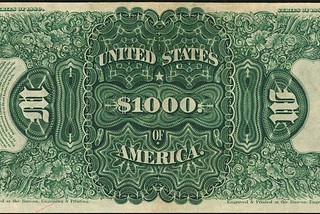
PREV ARTICLE
NEXT ARTICLE
FULL ISSUE
PREV FULL ISSUE
BARRON'S ARTICLE HIGHLIGHTS ANDERSON PAPER MONEYA March 19, 2018 article in Barron's highlights the Joel Anderson collection of U.S. Paper Money being auctioned by Stack’s Bowers. -Editor
According to the auction catalog, Anderson who lives in Alabama and owns a numismatic publishing company as well as TNT fireworks, the largest firework distributor in the country, had a goal to obtain the finest-condition of every major large-size federal paper money design from the first widely circulated issues of 1861 to the 1920s. U.S. currency was introduced in 1861 when the Union government realized that it didn’t have enough precious metal reserve in its treasury to fund the Civil War. As the U.S. is one of four nations never to have demonetized its currency—the U.K., Thailand and Canada, the others— it means that the notes can be used today for their face value no matter when it was issued. Not that anyone would want do that, as some of the rarer notes have estimates of up to $1.2 million, according to the auction catalogue. Part of the appeal for collectors is how artistically conceived the notes are. As a way to instill confidence in the American consumer to induce them to accept paper payments instead of coin, the government created complicated designs that would be both difficult to copy and instill a sense of gravitas and purpose in paper. That is why there are portraits of people who held lofty positions in the government or treasury on the front of the bills—it was all to give the American people a sense of calm in the Civil War. From a collector’s perspective, the ephemera of paper is another reason this collection is so attractive. “Currency is rarer than coins,” says Peter Treglia, director of currency of the Stack’s Bowers Galleries based in Santa Ana, California, which is in charge of the auction. “The stuff doesn’t last as long as coins, it gets weathered and damp and then it has to be pulped.” Anderson has interesting finds sprinkled through the catalog. From 1880, there is a $2 bill with a signature of Mississippian Blanche Kelso Bruce—the first African-American who served a full term in the senate and a two-term Register of the Treasury (May 1881-June 1885 and December 1897-March 1898). He was also the first African-American to have his signature on the U.S. currency. The estimated value is $3,000 to $4,000. To read the complete article (subscription required), see: Wayne Homren, Editor The Numismatic Bibliomania Society is a non-profit organization promoting numismatic literature. See our web site at coinbooks.org. To submit items for publication in The E-Sylum, write to the Editor at this address: whomren@gmail.com To subscribe go to: https://my.binhost.com/lists/listinfo/esylum All Rights Reserved. NBS Home Page Contact the NBS webmaster 
|
